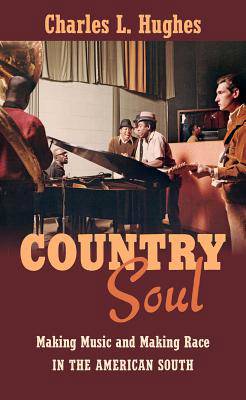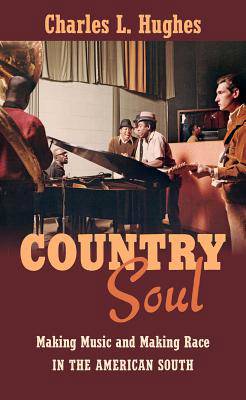
Door een staking bij bpost kan je online bestelling op dit moment iets langer onderweg zijn dan voorzien. Dringend iets nodig? Onze winkels ontvangen jou met open armen!
- Afhalen na 1 uur in een winkel met voorraad
- Gratis thuislevering in België vanaf € 30
- Ruim aanbod met 7 miljoen producten
Door een staking bij bpost kan je online bestelling op dit moment iets langer onderweg zijn dan voorzien. Dringend iets nodig? Onze winkels ontvangen jou met open armen!
- Afhalen na 1 uur in een winkel met voorraad
- Gratis thuislevering in België vanaf € 30
- Ruim aanbod met 7 miljoen producten
Zoeken
€ 53,45
+ 106 punten
Omschrijving
In the sound of the 1960s and 1970s, nothing symbolized the rift between black and white America better than the seemingly divided genres of country and soul. Yet the music emerged from the same songwriters, musicians, and producers in the recording studios of Memphis and Nashville, Tennessee, and Muscle Shoals, Alabama--what Charles L. Hughes calls the "country-soul triangle." In legendary studios like Stax and FAME, integrated groups of musicians like Booker T. and the MGs and the Muscle Shoals Rhythm Section produced music that both challenged and reconfirmed racial divisions in the United States. Working with artists from Aretha Franklin to Willie Nelson, these musicians became crucial contributors to the era's popular music and internationally recognized symbols of American racial politics in the turbulent years of civil rights protests, Black Power, and white backlash.
Hughes offers a provocative reinterpretation of this key moment in American popular music and challenges the conventional wisdom about the racial politics of southern studios and the music that emerged from them. Drawing on interviews and rarely used archives, Hughes brings to life the daily world of session musicians, producers, and songwriters at the heart of the country and soul scenes. In doing so, he shows how the country-soul triangle gave birth to new ways of thinking about music, race, labor, and the South in this pivotal period.
Hughes offers a provocative reinterpretation of this key moment in American popular music and challenges the conventional wisdom about the racial politics of southern studios and the music that emerged from them. Drawing on interviews and rarely used archives, Hughes brings to life the daily world of session musicians, producers, and songwriters at the heart of the country and soul scenes. In doing so, he shows how the country-soul triangle gave birth to new ways of thinking about music, race, labor, and the South in this pivotal period.
Specificaties
Betrokkenen
- Auteur(s):
- Uitgeverij:
Inhoud
- Aantal bladzijden:
- 280
- Taal:
- Engels
Eigenschappen
- Productcode (EAN):
- 9781469633428
- Verschijningsdatum:
- 1/02/2017
- Uitvoering:
- Paperback
- Formaat:
- Trade paperback (VS)
- Afmetingen:
- 155 mm x 231 mm
- Gewicht:
- 408 g

Alleen bij Standaard Boekhandel
+ 106 punten op je klantenkaart van Standaard Boekhandel
Beoordelingen
We publiceren alleen reviews die voldoen aan de voorwaarden voor reviews. Bekijk onze voorwaarden voor reviews.











